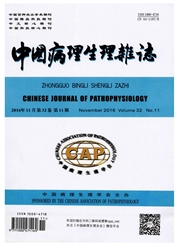

 中文摘要:
中文摘要:
过氧化物酶体增殖物激活受体(peroxisomepro.1iferator—activatedreceptors,PPARs)属于核受体超家族,它们通过调控靶基因转录参与体内多种生理病理过程。近年来,随着药理学及临床医学对PPARs的深入研究,其潜在的抗炎效应引起了人们的广泛关注。据报道,激活PPARs是他汀类药物产生抑炎效应的实现途径之一。他汀类能够激活PPARy并抑制LPS诱导的巨噬细胞的细胞因子表达[1]。Sug.amura等旧0的研究结论也支持该项发现,其数据显示他汀类通过激活PPARl稳定动脉粥样硬化斑块,并且联合应用辛伐他汀与PPARy激动剂,在抑制动脉粥样硬化斑块的治疗中显示出积极疗效。
 英文摘要:
英文摘要:
Peroxisome proliferator - activated receptors (PPARs) influence Toll - like receptors (TLRs) - nu- clear receptor- KB (NF - KB) signaling pathway through diverse mechanisms to negatively regulate TLR -NF - KB signa- ling - mediated inflammation and immune responses under para - inflammation condition. However, in pathological states, the balance between inhibition and promotion of inflammation, which is regulated by PPARs and TLR - NF - KB signaling pathway, respectively, has been broken down, resulting in inflammatory cascade and eventually causing chronic non - in- fectious inflammatory diseases, such as atberosclerosis, ulcerative colitis and rheumatoid arthritis. This review mainly focu- ses on the interaction between PPARs and TLR - NF - KB signaling pathway either in para - inflammatory status or patho- logical state, which highlights the importance of PPARs in the process of inflammation and immune responses and provides new interfering targets for the treatment of the diseases like coronary atherosclerotic heart disease.
 同期刊论文项目
同期刊论文项目
 同项目期刊论文
同项目期刊论文
 期刊信息
期刊信息
